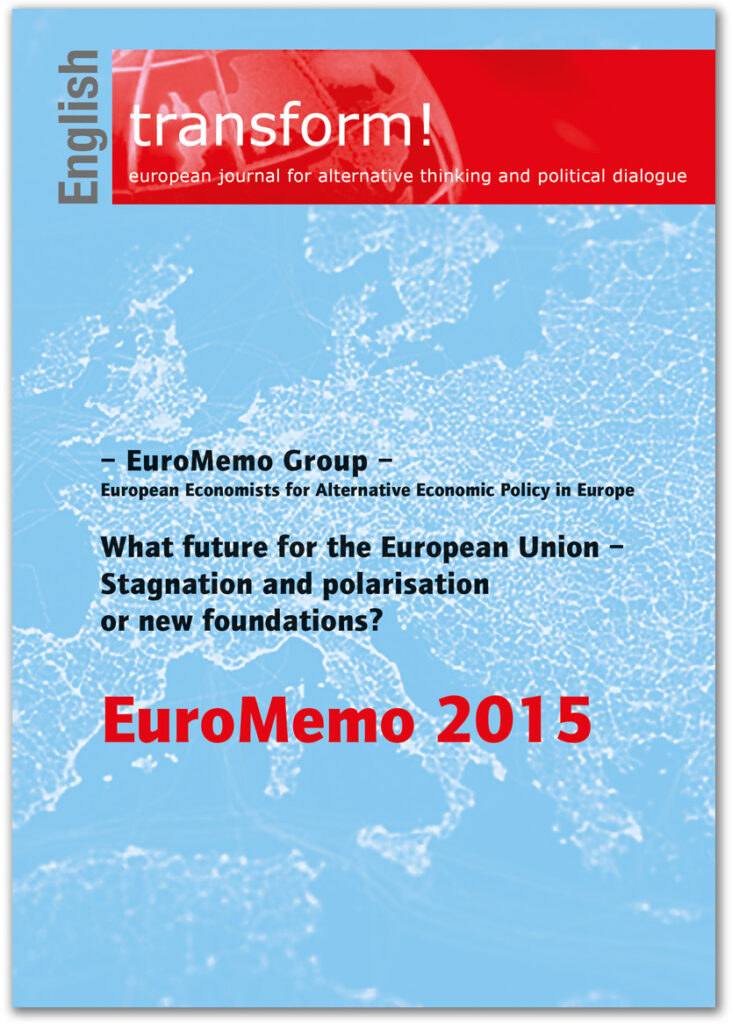As in past years, transform! europe has taken on the responsibility for the production of the printed versions of EuroMemorandum in English, French, and German.
Thus we hope not only to provide a useful contribution to the European debate on social, economic and ecological alternatives but also to help the development of a broad political movement towards another Europe and a change of the balance of power in its favour.
The EuroMemorandum is edited by the group European Economists for an Alternative Economic Policy (EuroMemo Group) and is supported by more than 300 economists.
Please find the ePaper on the left in English (PDF).
For ordering the brochure, please contact via e-mail:
- English version: office@transform-network.net
- French version: espaces_Marx@internatif.org (Espaces Marx)
- German version: redaktion@sozialismus.de (Sozialismus)
Editorial
Like every year the EuroMemorandum puts up for discussion a solid and profound analysis, collectively compiled, of the condition of the European economic situation, in particular of the member states of the European Union, drawing from it relevant conclusions for both politics and economy. As has been the custom for several years now, the transform! europe network is responsible also this year for the Memorandum going to print in several languages.
However, in 2015 the publication happens in midst a specific political context. The elections having taken place in Greece at the end of January have led to a landslide victory of the left party of SYRIZA, followed by a government taking office whose declared aim is to bring to an end the affliction imposed on the country.
The first fundamental truth which to accept presents a major difficulty to the politics of the EU-establishment lies in the fact that on 25 January the Greek people has not only voted out of office a bankrupt government but also the politics of austerity imposed on them. This truth does not only concern Greece but all of Europe. Therefore an alternative to austerity politics does not only seem a scientifically substantiated possibility but it can become a political reality by winning democratic majorities.
The new Greek government has made it clear that, besides overcoming the humanitarian catastrophe the country has been plunged into by austerity politics, it does not want to rely on the tax moneys of other EU-states but wants to make use of internal resources for economic reconstruction. To that end it has presented a programme aiming at a fight against corruption and tax evasion as well as for a socially just, effective system of taxation. Also in this respect a successful SYRIZA government could be an example for the reconstruction of European politics.
In that respect the concepts of the Greek government converge with the strategic suggestions proposed in EuroMemo 2015 which claim that “policies are required to rebuild productive capacity and to improve the competitiveness of the deficit countries. The regional and structural policies of the European Union should be strengthened and expanded, and a new industrial policy based on a major programme of public and private investment is required (for fuller details, see chapter 3). Programmes from the European Union to support and fund private investment in the deficit countries (and more generally in EU states with lower levels of income) are also required.”
What Greece requires and what it demands from the EU and its member states as its moral and political right is the time and the fiscal and political leeway to implement its programmes.
To acknowledge that poses an extraordinary difficulty for the established elites. Practically from the very first day in office the Tsipras government has found itself exposed to an enormous political and economic pressure exerted on it by both the Euro group and some governments, pressure which aims at enforcing a prolongation of the previous politics which has failed.
This disrespect for the democratic will of the Greek people is inacceptable and has led to solidarity with Greece far beyond the circles of the “usual suspects”. Renowned researchers from all over Europe and around the world, social movements, the European Trade Union Confederation, the trade unions with most members from Germany, Austria, Ireland, France and other countries, even the Vatican, parliamentarians from all progressive party families as well as the Austrian Chancellor, all have spoken in favour of a constructive attitude vis-à-vis the Tsipras government and the suggestions proposed by it.
Yet all these positive reactions are not sufficient yet in order to fight off the pressures on the new government.
Europe finds itself at a crossroads and the decision about the direction it is going to take will be made in a dispute between contrasting political options. The risks implied in this, finding expression in an increase of nationalist and populist movements and parties of the radical Right, are considerable. At the same time there are also new possibilities and chances. In that the open discussion of ideas is of particular importance. And the EuroMemo is a crucial and indispensable contribution to that.
Walter Baier
Co-ordinator of transform! europe
February 2015
